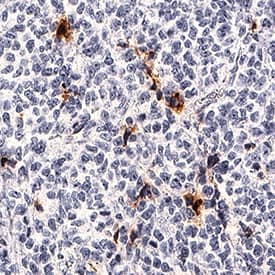Human Midkine Antibody
R&D Systems, part of Bio-Techne | Catalog # MAB2583

Key Product Details
Species Reactivity
Validated:
Cited:
Applications
Validated:
Cited:
Label
Antibody Source
Product Specifications
Immunogen
Lys23-Asp143
Accession # P21741
Specificity
Clonality
Host
Isotype
Scientific Data Images for Human Midkine Antibody
Midkine in Human Liver Cancer Tissue.
Midkine was detected in immersion fixed paraffin-embedded sections of human liver cancer tissue using Mouse Anti-Human Midkine Monoclonal Antibody (Catalog # MAB2583) at 5 µg/mL for 1 hour at room temperature followed by incubation with the Anti-Mouse IgG VisUCyte™ HRP Polymer Antibody (VC001). Before incubation with the primary antibody, tissue was subjected to heat-induced epitope retrieval using Antigen Retrieval Reagent-Basic (CTS013). Tissue was stained using DAB (brown) and counterstained with hematoxylin (blue). Specific staining was localized to cytoplasm. View our protocol for IHC Staining with VisUCyte HRP Polymer Detection Reagents.Detection of Midkine by Immunoprecipitation.
Immunoprecipitation was performed on concentrated culture media of HAP1 human near-haploid cell using 2.0 μg of Mouse Anti-Human Midkine Monoclonal Antibody (Catalog # MAB2583) pre-coupled to protein G or protein A beads. Immunoprecipitated Midkine was detected with Goat Anti-Human Midkine Polyclonal Antibody (AF-258-PB) at 1.0 μg/ml. The Ponceau stained transfers of each blot are shown. SM=10% starting material; UB=10% unbound fraction; IP=immunoprecipitated. Image, protocol, and testing courtesy of YCharOS Inc. (ycharos.com).Applications for Human Midkine Antibody
Immunohistochemistry
Sample: Immersion fixed paraffin-embedded sections of human liver cancer tissue
Immunoprecipitation
Sample: Concentrated culture media of HAP1 human near-haploid cells
Reviewed Applications
Read 1 review rated 5 using MAB2583 in the following applications:
Formulation, Preparation, and Storage
Purification
Reconstitution
Formulation
Shipping
Stability & Storage
- 12 months from date of receipt, -20 to -70 °C as supplied.
- 1 month, 2 to 8 °C under sterile conditions after reconstitution.
- 6 months, -20 to -70 °C under sterile conditions after reconstitution.
Background: Midkine
Midkine is a highly basic, nonglycosylated polypeptide that contains five intrachain disulfide bonds. The predicted molecular weight is approximately 13.3 kDa, based on a mature peptide length of 118 amino acid residues in the mouse and 121 amino acid residues in the human. Across species, MK shows 87% identity between the human and murine proteins. Between family members, human MK is approximately 50% identical to human PTN, with conservation of all 10 cysteines. Initial structure-function studies indicate that the C-terminal half of MK contains the principal heparin-binding site plus the molecule’s antigenicity and neurite-promoting sequences; while both the C- and N-termini are necessary for the molecule’s neurotrophic effects. Cells known to produce MK include endothelial cells, fetal astrocytes, renal proximal tubule epithelial cells and Wilms’ (kidney) tumor cells. MK has also been identified in the senile plaques of patients with Alzheimer’s disease. The pattern of expression of midkine during development strongly suggests a role for this factor both in epithelial-mesenchymal interactions and in development of the nervous system.
References
- Bohlen, P. and I. Kovesdi (1991) Prog. Growth Factor Res. 3:143.
- Muramatsu, T. (1993) Int. J. Dev. Biol. 37:183.
Alternate Names
Gene Symbol
UniProt
Additional Midkine Products
Product Documents for Human Midkine Antibody
Product Specific Notices for Human Midkine Antibody
For research use only

